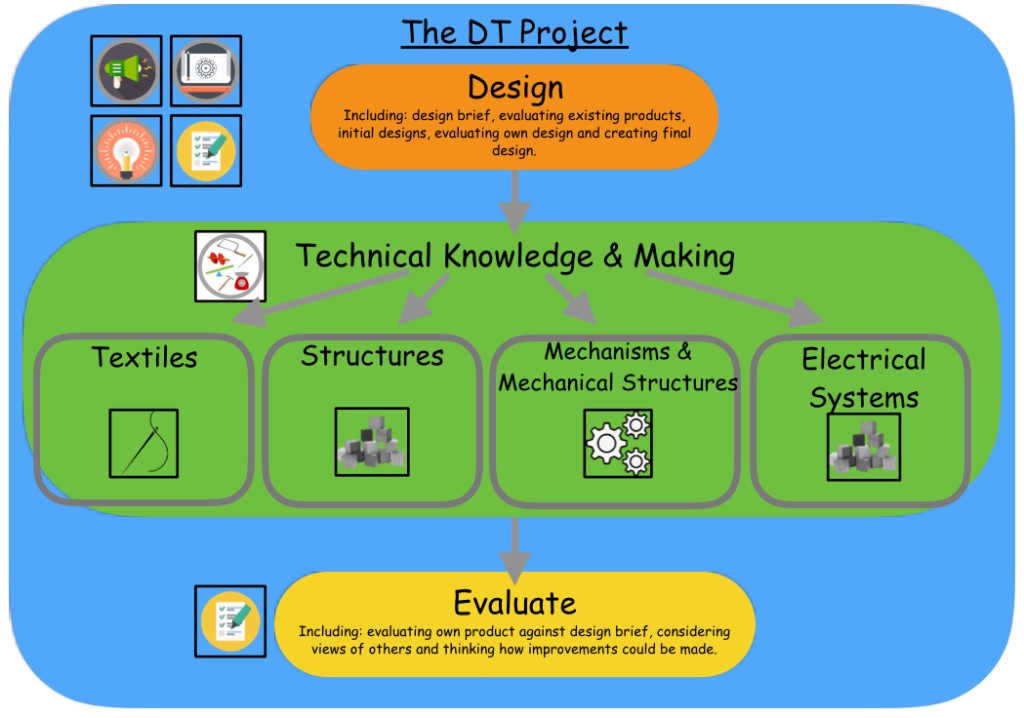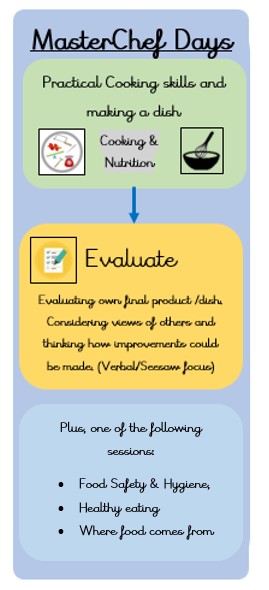Design and Technology at Beech Hill School is taught purposefully in all year groups to allow children to safely develop their skills, work independently or in teams and become creative problem-solvers & makers. Our DT curriculum gives children the opportunity to design and make ‘something‘ for ‘somebody‘ for ‘some purpose‘.
We teach design and technology during specific focus weeks twice a year linked to the national curriculum objectives and our progression of skills for individual year groups. Within our DT projects we set the scene with a design brief that is relevant and gives the children a purposeful context. Children are then given the opportunity to look at and evaluate existing products and designs, considering designs from the past, and deciding on how to improve them. Taking into account the design brief and aspects learnt from existing designs, children create their own initial designs, evaluate them and then pull ideas together for final designs. Within this, children may test different materials, create prototypes or use computer-aided software in their designs. Children are then taught a range of useful practical skills and apply these skills in making their final product as per their own designs. When the product is complete children with evaluate against the design brief, and also share with peers and people linked with the brief.
(See image below for how this process flows through)

For the half terms without a DT week, we have a stand-alone ‘MasterChef’ day to cover the Cooking and Nutrition part of the Curriculum. This allows for development of practical skills and creating a dish; whilst also looking at food safety & hygiene, healthy eating, where food comes from and seasonal foods. Learning how to cook provides children with a crucial life skill and allows development of some of our core principles as a school, of independence and basic skills.
(See image below for how the MasterChef days are sequenced)

Our DT curriculum for years 1 – 6 is based on the National Curriculum as defined by the Department for Education. The DT curriculum is underpinned by providing our children with wider opportunities, independent learning and basic skills.
We offer opportunities to focus on the development of the key technical areas of the DT curriculum – textiles, structures, mechanics & mechanical systems and for KS2 electrical systems. The structure of the DT weeks are detailed above. The way our DT curriculum is structured allow these technical aspects of the curriculum to be revisited and build on throughout the key stages (Key Stage 1, Lower Key Stage 2 and Upper Key Stage 2). Where appropriate, the DT project has a topical link to that half term’s Curriculum focus. For example, Year 6 creating model Anderson shelters linked with their WW2 Topic; Year 3 making an Anglo Saxon money pouch within their Anglo Saxon Topic; Year 2 making a bandstand during their Brilliant Beaches topic.
Our MasterChef days allow for full coverage of the Cooking and Nutrition parts of the DT National Curriculum. As part of their work with food, the practical dishes and skills learnt link with the focus Curriculum Topic area where possible – for example Greek salad for Year 5s within their Ancient Greece Topic or baking soda-bread rolls for Year 2s within their Great Fire of London Topic. This, and the other Topic link sessions allow a wider, enriched understanding of the main Topic, outside of the focus History or Geography objectives, whilst also instilling a love of cooking and knowledge of how to cook and apply the principles of nutrition and healthy eating. Our Summer 1 MasterChef days allow for a Celebration of Beech Hill through food – throughout the year groups we focus on some of the traditional foods from some of the main cultural groups that make up our school. We look at South Asian, Eastern European and British foods – how to make them, what they taste like, where they come from and the similarities between them! (The Cookery & Nutrition curriculum has its own specific skills progression, which includes Reception, allowing the introduction of these skills at an early stage and the smooth progression into Year 1.)
Why? These projects and themes have been established to ensure that knowledge and understanding is sequenced, relevant and can support children in building upon prior learning. The unit is planned in a way so that key skills are recapped and revisited to encourage retention. Lessons are then planned against a progressive set of practical skills taken from our in-house progression of skills document. We regularly have opportunities to link our English and Maths to our DT projects – for example maths measurement skills, wider understanding of a historical context through design, or with opportunities to reinforce basic English and Maths skills. Teaching DT in this way supports the learning in other subjects to give a contextual understanding as well as supporting retention.
In early years, DT is woven throughout the curriculum as show in the Long-Term Overview.
Sample must knows and photos of work
